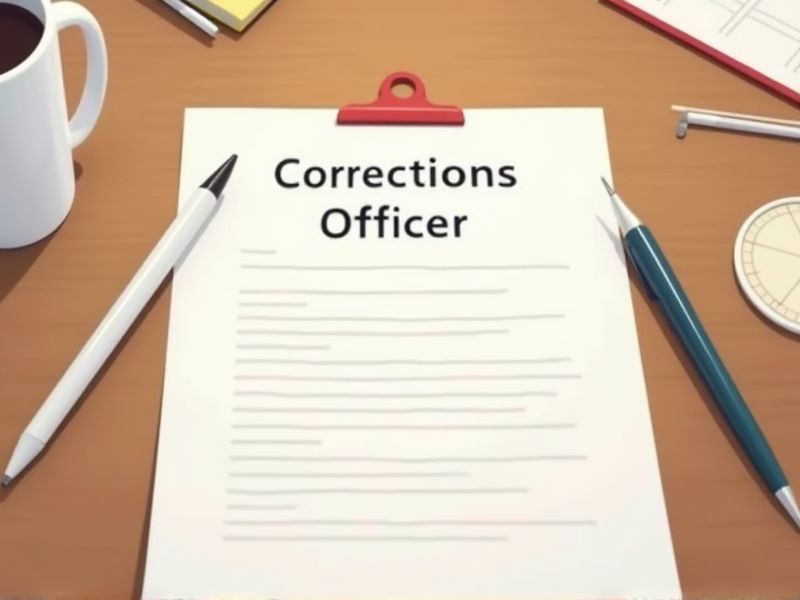
Corrections Officers play a critical role in maintaining safety and order within correctional facilities, directly impacting the rehabilitation of inmates. Certification ensures that these officers are equipped with the necessary skills to handle volatile situations effectively and ethically. Such certifications often cover essential areas like crisis management, legal knowledge, and communication skills, enhancing the officer's ability to perform their duties efficiently. Key certifications relevant to a Corrections Officer include the following.
Basic Correctional Officer Certification
The Basic Correctional Officer Certification ensures that corrections officers acquire foundational knowledge and skills essential for maintaining safety and security in correctional facilities. Certification helps standardize training across the board, leading to more consistent practices and protocols within the justice system. Post-certification, officers demonstrate preparedness to handle complex situations involving inmate management and crisis intervention. Certification validates officer competence, enhancing public trust and confidence in the corrections system.
Crisis Intervention Training (CIT) Certification
Crisis Intervention Training (CIT) Certification equips corrections officers with the skills necessary to effectively manage and de-escalate situations involving inmates with mental health issues, reducing the likelihood of harm. With mental health disorders prevalent in correctional facilities, CIT enhances an officer's ability to identify and respond to signs of distress, increasing inmate and officer safety. The certification supports a more humane approach, promoting rehabilitation over punitive measures, which can lead to better long-term outcomes for inmates. Data indicates that correctional staff with CIT training experience fewer incidents of violence and disciplinary action within facilities, demonstrating its effectiveness.
Use of Force and Defensive Tactics Certification
Corrections officers face potentially dangerous situations in their daily duties, necessitating proficiency in use of force and defensive tactics to ensure personal and facility safety. Certification provides standardized training and guidelines, reducing the risk of liability and enhancing legal compliance amidst complex and evolving regulations. Acquiring this certification can boost officer confidence in handling confrontations, subsequently lowering the incidence of excessive force claims. Consistent training leads to a safer environment for both staff and inmates, fostering a more stable correctional facility.
Firearms Proficiency Certification
Firearms proficiency certification ensures corrections officers can safely handle and operate firearms, which reduces the risk of accidental discharge incidents. A certified officer demonstrates capability in threat assessment and response, enhancing overall security within correctional facilities. Proper training and certification build confidence among officers, contributing to a more effective law enforcement environment. Compliance with certification standards meets legal and institutional safety regulations, protecting the facility and its personnel from potential liabilities.
First Aid and CPR Certification
Corrections officers frequently encounter high-risk situations where inmates may suffer from injuries or medical emergencies, necessitating immediate first aid and CPR to stabilize them until medical professionals arrive. The certification equips officers with essential skills to quickly respond to possible life-threatening scenarios, reducing the risk of fatal outcomes in a confined environment. The ability to administer first aid and CPR enhances the safety protocol of correctional facilities, aligning with legal and ethical responsibilities to protect the well-being of all individuals. Correctional staff without proper certification might inadvertently contribute to increased liability for the institution in case of preventable fatalities or inadequate response to medical crises.
Correctional Facility Management Certification
Correctional Facility Management Certification imparts corrections officers with essential skills and knowledge to manage complex correctional environments effectively. Without proper certification, officers may lack the understanding of security protocols and rehabilitative strategies, potentially leading to higher incident rates within facilities. Certification enhances credibility and professional development, making officers more proficient in their roles. Data indicates that certified officers tend to contribute to a safer and more orderly institution, reducing turnover and improving inmate outcomes.
Self-Defense Techniques Certification
Certification in self-defense techniques is vital for corrections officers because it equips them with skills to manage and de-escalate potentially violent situations, thereby reducing the likelihood of injury. Training enhances their ability to maintain control over inmates, ensuring a safer environment for both staff and prisoners. Mastery of self-defense allows officers to respond to threats with appropriate force, minimizing excessive force incidents and legal liabilities. Formal certification verifies that officers have met standardized competency levels, which can be crucial during investigations or legal proceedings.
Emergency Response and Evacuation Certification
Corrections officers often work in unpredictable environments where incidents like fires or riots can occur, so having an Emergency Response and Evacuation Certification enhances their preparedness in managing these critical situations. Enhanced training in emergency procedures leads to more effective evacuation plans, reducing potential harm to both inmates and staff. Knowledge from such certification fosters a safer environment within correctional facilities, minimizing liability and ensuring compliance with safety regulations. Properly trained officers contribute to quicker incident resolution, mitigating risks and preserving order within the facility.
Mental Health First Aid Certification
Correctional facilities often house individuals with mental health issues; without proper training, officers may misinterpret behaviors as defiance rather than symptoms. Training in Mental Health First Aid equips officers with skills to de-escalate situations effectively, reducing the risk of harm to both inmates and staff. Such certification fosters a supportive environment, which can lead to better rehabilitation outcomes for incarcerated individuals. Ultimately, it promotes a safer and more humane correctional environment, aligning practices with modern mental health standards.
Nonviolent Communication and De-escalation Certification
Nonviolent Communication and De-escalation Certification for corrections officers enhances effective conflict resolution, reducing the likelihood of violent outbursts. Trained officers perceive changes in inmate behavior more accurately, leading to timely interventions before conflicts escalate. Certification programs improve communication skills, fostering more trusting interactions between officers and inmates. Providing officers with these skills contributes to a safer environment in correctional facilities, minimizing injury risks for both staff and inmates.
Summary
You can expect enhanced skills in managing inmates safely and effectively when Corrections Officers obtain certifications. Certifications often lead to better career advancement opportunities, potentially resulting in higher pay and promotions. By undergoing specialized training, officers can improve their crisis intervention abilities, contributing to a safer environment within the facility. This professional development also tends to increase job satisfaction and reduce turnover rates in correctional institutions.
